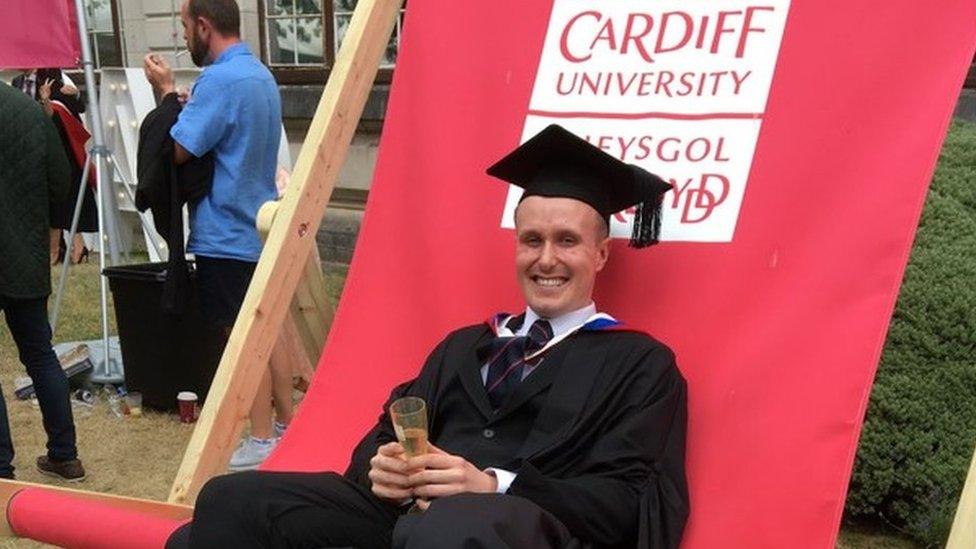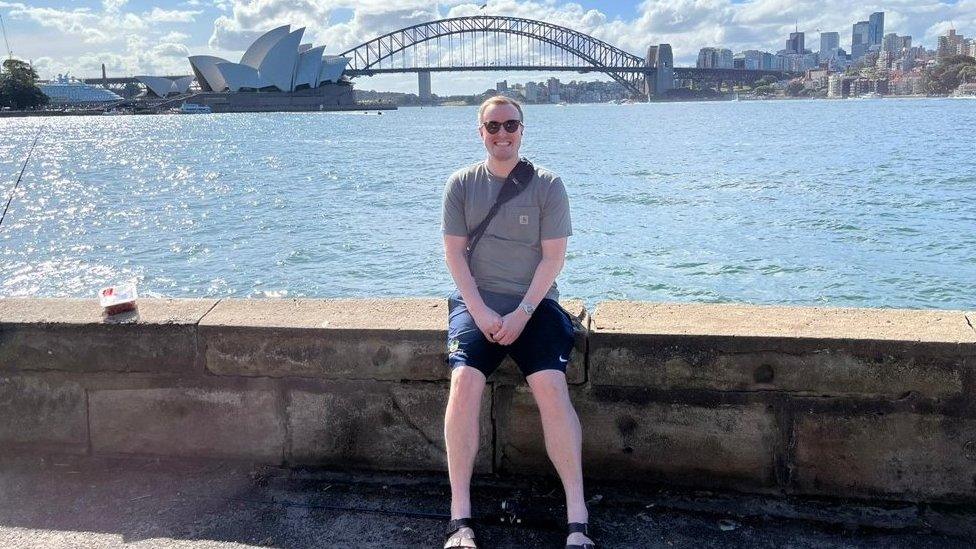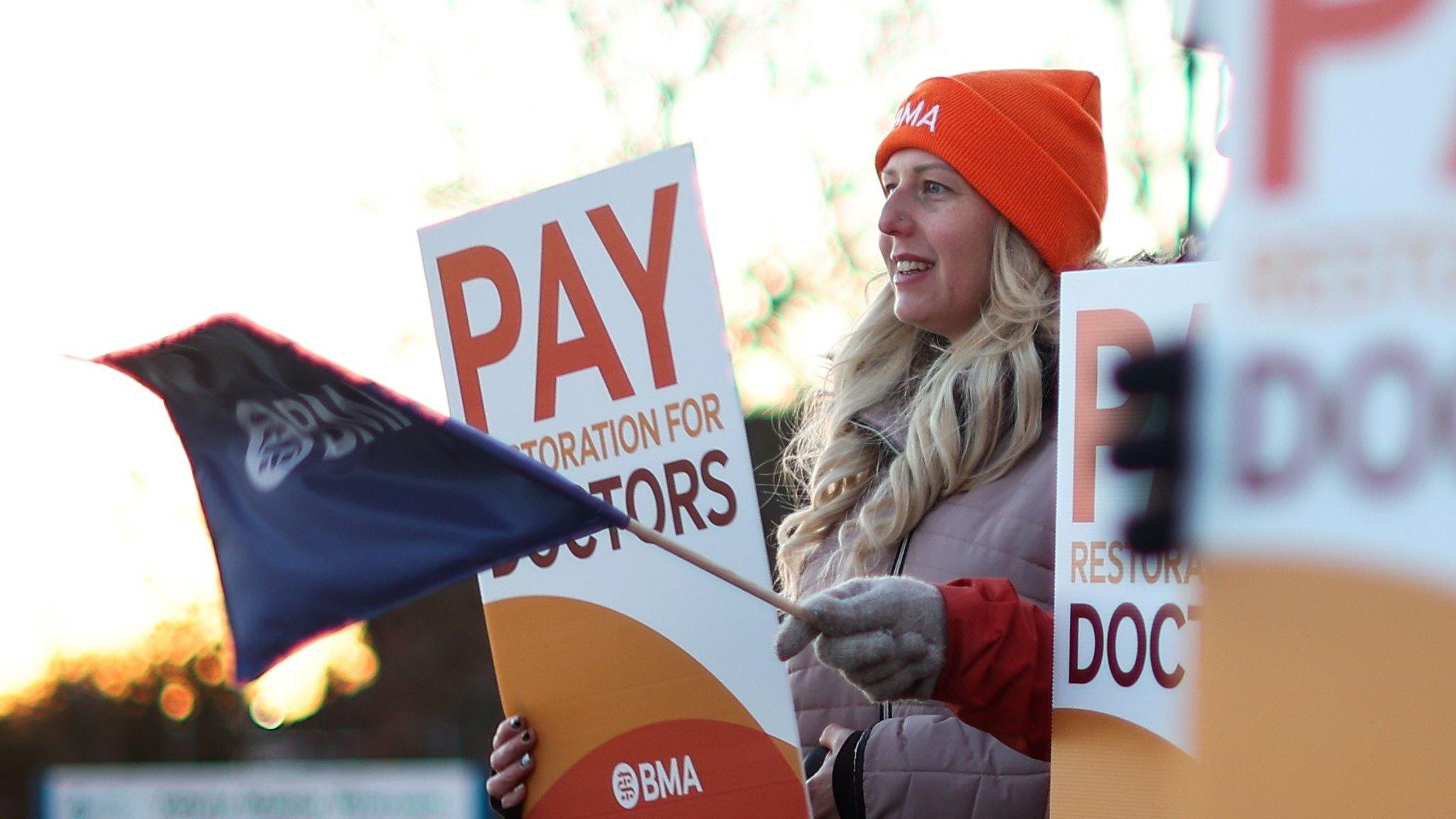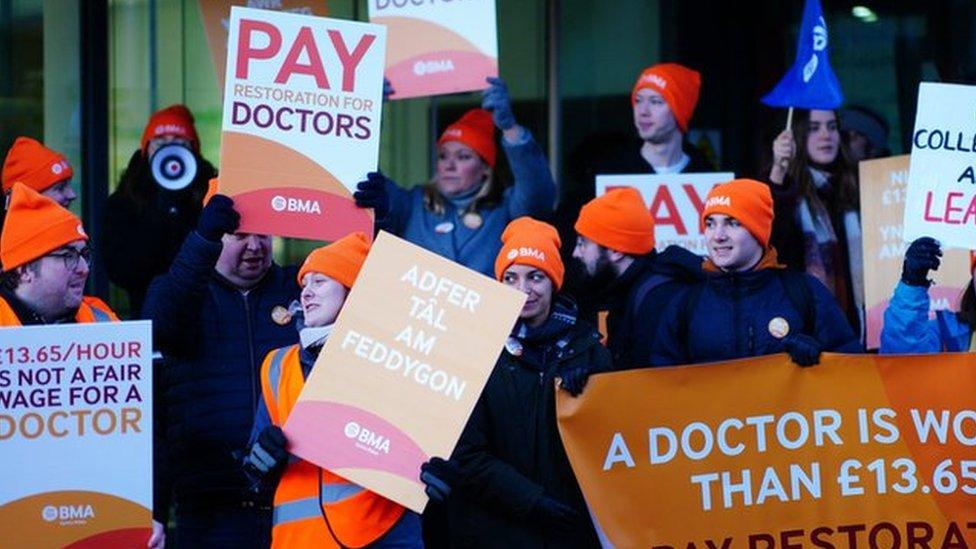Junior doctor strikes: Medic leaves Wales for Australia
- Published

Jack Tagg graduated from Cardiff University but has now started a new life in Australia
On his last shift in Wales, Jack Tagg was responsible for 35 patients in a urology department.
Two months since moving to Australia, he says his salary has doubled, he has less emotional stress and colleagues apologise if he has to manage 10 patients on his own.
Wales' junior doctors are on strike for the final day on Wednesday before normal NHS services resume on Thursday.
Jack said he supported moves to improve things back home.
The Welsh government has already given a 5% pay rise to all NHS staff and said it was "at the limits" of what it can afford.
"The worst day I've had here has been a third less patients to manage, for pretty much double the salary," said the 28-year-old, who is now part of a large ex-pat community.
The positives experiences of doctors such as Jack are not lost on those picketing, with placards and interviews often including anecdotes about those who have also departed for wards in Australia.
Jack added: "Speaking to colleagues at home, it would be another five or six years before I'd reached the salary I'm achieving here."

Jack is enjoying life in Australia and visited the Randwick Races in Sydney on Boxing Day
Originally from Leeds, Jack studied medicine at Cardiff University for six years, then spent two years working as a junior doctor in south and west Wales, before deciding to make the move abroad.
"I found the work difficult, because the workloads were huge, the emotional stress was high, and when you combine that with the pretty dismal pay, I just moved to Australia because I thought the lifestyle I could lead here would be better," he added.
"Since I've moved, the pay has been significantly better."
He said his last year working in Wales resulted in an hourly rate of about £13.65 to £14, because he had a relatively low number of on-call shifts.
"I think the £19 an hour that colleagues back home are asking for is completely reasonable," Jack said.
"In fact, it's absolutely vital for the NHS, because that wage currently it's disrespectful to doctors.
"It's unsustainable for the NHS and ultimately it's dangerous for patients."
He is now working as a first year psychiatry registrar in New South Wales, and added: "The cost of living is comparable.
"I'm not going to say it's way cheaper than the UK, because it isn't.
"But when you increase wages, you increase morale and staff retention, you reduce that workload and the lifestyle you can lead improves."

Jack is enjoying the weather and job conditions in Australia
Naturally there are downsides to being on the other side of the world to family and friends - though his partner who is also a junior doctor, plans to join him next month.
"The more specific downside for me is the football is an absolute nightmare to watch over here," he laughed.
"The timings are rotten because it's 11 hours ahead. But I can definitely deal with that for all the perks you get with the increased staff retention and the increased morale."
Jack moved to Australia on a "skills shortage visa" for 15 months, and explained that as part of his contract, he is based in a rural area initially, before moving to Sydney for the rest of his contract.
He said the option is also open to join the formal six-year training program.
"They're really keen to have UK doctors because I think we are slightly more experienced - just because of the heavy workloads we've been dealing with back in the UK," he said.
"That's one of the few benefits of the experience in the UK - you're forced to swim, because otherwise you'd sink.
"That last day managing 35 patients, it was just ridiculous, it wasn't safe. And it doesn't feel good presiding over that sort of care when you're doing your best but ultimately, sometimes that still won't be enough."
During Tuesday's strikes, about 30% of all operations and more than 45% of outpatient appointments were cancelled in Wales.
Health Minister Eluned Morgan said the Welsh government was "always open" to further discussions with the BMA and interested in negotiating a new contract, and said there were opportunities to reopen talks.
The 5% given by the Welsh government was offered despite the doctors' pay review body recommendation of 6% - though no part of the UK has accepted that figure either.
Ms Morgan has spoken of her frustration at the lack of clarity from the UK government about how they have funded pay rises in England.
She said if additional resources have come from the Treasury, rather than the NHS budget, Wales would be entitled to a consequential, but that clarity hadn't been provided.
The UK government said the Welsh government has been given its highest settlement since devolution and must answer to the Senedd and people of Wales on how it chooses to fund services.


- Published16 January 2024

- Published15 January 2024
